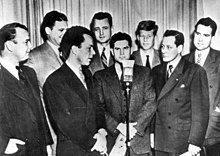Olin E. Teague
Tiger Teague | |
|---|---|
 | |
| Chair of the House Science Committee | |
| In office January 3, 1973 – December 31, 1978 | |
| Preceded by | George P. Miller |
| Succeeded by | Don Fuqua |
| Chair of the House Veterans' Affairs Committee | |
| In office January 3, 1955 – January 3, 1973 | |
| Preceded by | Edith Nourse Rogers |
| Succeeded by | William Jennings Bryan Dorn |
| Member of the U.S. House of Representatives from Texas's 6th district | |
| In office August 24, 1946 – December 31, 1978 | |
| Preceded by | Luther A. Johnson |
| Succeeded by | Phil Gramm |
| Personal details | |
| Born | Olin Earl Teague April 6, 1910 Woodward, Oklahoma, U.S. |
| Died | January 23, 1981 (aged 70) Bethesda, Maryland, U.S. |
| Political party | Democratic |
| Education | Texas A&M University |
| Signature | |
| Military service | |
| Allegiance | |
| Branch/service | United States Army |
| Years of service | 1940–1946 |
| Rank | Colonel |
| Awards | Silver Star Bronze Star Purple Heart (2) |
Olin Earl "Tiger" Teague (April 6, 1910 – January 23, 1981) was an American politician and World War II veteran who served as the U.S. representative for Texas's 6th congressional district as a Democrat for 32 years, from 1946 to 1978. He is buried in Arlington National Cemetery.
Biography
[edit]Early life
[edit]
Born in Oklahoma and raised in Mena, Arkansas, Teague graduated from the Agricultural and Mechanical College of Texas (now Texas A&M University) in 1932. He joined the United States Army in 1940 as a lieutenant and was discharged in 1946 as a colonel. He participated in the D-Day invasion of Normandy, and was a decorated combat veteran of World War II, receiving the Silver Star with two clusters, the Bronze Star, and two Purple Hearts.[1]
The nickname "Tiger" came from his play on the football field while in high school.[citation needed]
Congressional career
[edit]
While in Congress, he was a champion for veterans, authoring more veterans' legislation than any congressmember before him.[2] He was one of the majority of the Texan delegation to decline to sign the 1956 Southern Manifesto[3] opposing the desegregation of public schools ordered by the Supreme Court in Brown v. Board of Education. However, Teague voted against the Civil Rights Acts of 1957,[4] 1960,[5] 1964,[6] and 1968,[7] as well as the 24th Amendment to the U.S. Constitution and the Voting Rights Act of 1965.[8][9]
He proposed 50 amendments in Congress, including: Providing for the election of President and Vice President; to abolish the electoral college (1953); Provides representation for the people of the District of Columbia (1957); Relative to appointment of postmasters (1959); Proposal with respect to the appointment of postmasters (1961); Empowering Congress to grant representation in the Congress and among the electors of President and Vice President to the people of the District of Columbia (1950, 1951, and 1953); Equal rights regardless of sex (1967).[10]
He was instrumental in improving benefits for servicemen's survivors. In 1956, he helped overhaul the survivor's benefits, with the creation of the Dependency and Indemnity Compensation. He was also chairman of the House Democratic Caucus, chairman of the House Committee on Veterans Affairs (1955–1972), and chairman of the House Committee on Science and Astronautics (1973–1978). Before 1973, he also chaired the Manned Space Flight Subcommittee and in that capacity oversaw NASA's efforts to place a man on the moon.[11] In 1976, Teague was pivotal in establishing the Office of Science and Technology Policy.
Legacy
[edit]The Olin E. Teague Veterans Center, a VA hospital and health center in Temple, Texas, was named for him. The VA also presents the annual Olin E. Teague Award for contributions to improving the quality of life of disabled veterans. Also named for him were the Olin E. Teague Research Center at Texas A&M, a space research facility, and the original visitor center at the Johnson Space Center (closed in 1992).
References
[edit]- ^ Past Chairmen of House Committee on Veteran's Affairs
- ^ R. Jim Nicholson (12 October 2005). "Secretary Nicholson Speech: Remarks by The Hon. James Nicholson, Secretary of Veterans Affairs: 25th Annual Olin E. Teague Award". United States Department of Veterans Affairs. Retrieved 2006-08-29.
- ^ "Southern Manifesto" (PDF). Congressional Record - Senate: 4459–4461.
- ^ "HR 6127. CIVIL RIGHTS ACT OF 1957". GovTrack.us.
- ^ "HR 8601. PASSAGE".
- ^ "H.R. 7152. PASSAGE".
- ^ "TO PASS H.R. 2516, A BILL TO ESTABLISH PENALTIES FOR INTERFERENCE WITH CIVIL RIGHTS. INTERFERENCE WITH A PERSON ENGAGED IN ONE OF THE 8 ACTIVITIES PROTECTED UNDER THIS BILL MUST BE RACIALLY MOTIVATED TO INCUR THE BILL'S PENALTIES".
- ^ "S.J. RES. 29. CONSTITUTIONAL AMENDMENT TO BAN THE USE OF POLL TAX AS A REQUIREMENT FOR VOTING IN FEDERAL ELECTIONS". GovTrack.us.
- ^ "TO PASS H.R. 6400, THE 1965 VOTING RIGHTS ACT".
- ^ "Data.gov Data Set Proposed Amendments". 25 February 2016.
- ^ "A History of the Committee on Science". United States House Committee on Science. Archived from the original on 2006-08-24. Retrieved 2006-08-29.
External links
[edit]- Olin Earl Teague from the Handbook of Texas Online
- United States Congress. "Olin E. Teague (id: T000110)". Biographical Directory of the United States Congress. Retrieved on 2008-02-11
- Olin E. Teague Veterans Center from the Handbook of Texas Online
- Past Chairmen of the House Veterans Affairs Committee
- 1910 births
- 1981 deaths
- People from Mena, Arkansas
- People from Woodward, Oklahoma
- Burials at Arlington National Cemetery
- Texas A&M University alumni
- United States Army personnel of World War II
- United States Army officers
- Recipients of the Silver Star
- Democratic Party members of the United States House of Representatives from Texas
- 20th-century members of the United States House of Representatives

